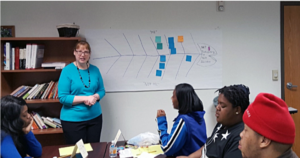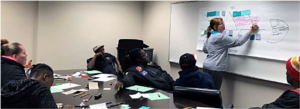Moving the Needle in Virginia Adult Education: Reaching One Adult at a Time
by Margaret Patterson
It may come as a surprise to adult educators to learn that nationally adult education programs serve about 10% of those in need of services–and that 90% of adults who are eligible for program services don’t get involved. Researcher Margaret Patterson, of Research Allies for Lifelong Learning in Vienna, Virginia, calls them the “Forgotten 90%,” after a 2018 paper of the same name published in Adult Education Quarterly. Dr. Patterson recalls sitting in her office at the American Council on Education in D.C. about ten years ago and poring over GED® testing statistics. “I kept seeing percentages of 4%, 2%, or 8% in different states—very small proportions of the target population that we were reaching. I didn’t believe the numbers were that low.” After confirming the percentages were on target through Census and other national data, she realized something had to be done.
Fast forward to 2017: After submitting for publication the “Forgotten 90%” paper, which reviewed U.S. Programme for International Assessment of Adult Competencies (PIAAC) data on adults with less than a high school diploma (LHS) who were not involved in education, Dr. Patterson realized that although large scale quantitative data on LHS adults were informative, they didn’t answer the most important questions. “It was one thing to know that these adults were older than our typical students, that many had low social trust and fair or poor health, and that adults from the South and Midwest were overrepresented. But that didn’t tell us why they did, or how it came to happen,” she explained. “We needed to know more about the barriers they faced.”

Thus, CAPE was born. Working with VALUEUSA, Dr. Patterson wrote a grant to the Dollar General Literacy Foundation for Critiquing Adult Participation in Education (CAPE) research, which was funded in mid-2017. Pennsylvania-based VALUEUSA, which calls itself the national alumni association of adult learners, believed the best way to learn about adults’ barriers was to ask them. With Dollar General’s generous support and VALUEUSA’s sponsorship, Dr. Patterson, her research partner Dr. Wei Song, and their team were able to visit five states and survey and interview 125 adults.
CAPE work started in Virginia. Drs. Patterson and Song visited an adult education program in Salem, Virginia, first surveying adults and then conducting a small group interview. Most were former adult learners; one was considering enrolling and another had no interest in learning more. Researchers guided them through a root cause analysis technique to help “peel back the layers” of the reasons adults gave for not participating in education. After the Salem research session, the researchers knew they were on to something big—information about prospective learners that could not only explain barriers, but also offer solutions on how to move the needle to recruit and keep more of the 90% involved in adult education.
In 2018, three reports came out of the CAPE research (available for free download at the VALUEUSA website):

In May 2018, Dr. Patterson was asked to present the first report at a congressional briefing to the Adult Literacy Caucus on Capitol Hill. She was impressed with the interest congressional staffers showed in the results, particularly in the solutions that adults recommended to get them involved. Since then, she has presented CAPE results to approximately 500 adult educators across the U.S. A recent participant said, “I want to thank you for offering this CAPE session today. It reminded me of how I need to get back to my roots and why I even got into adult education in the first place. It’s all about the adults.”
In fall 2018, Dr. Heidi Silver-Pacuilla of the Virginia Department of Education and Joanne Huebner of the Virginia Adult Learning Resource Center approached Dr. Patterson about sharing CAPE results with Virginia adult educators. They had read the CAPE reports and wanted Virginia adult educators to have the opportunity for a deeper dive into the material, especially since the reports focused on two issues of importance to Virginia adult education, boosting recruitment and enhancing retention.
Dr. Silver-Pacuilla envisioned a virtual study circle, employing technology to allow program administrators from across the state to read and discuss reports, think through adults’ recommendations on how to reach them, and identify ways to implement solutions to keep adults involved in adult education through completion. Dr. Patterson developed a four-part online series of study circles, offering Outreach and Advocacy (Part 1) in December 2018 and Customizing Instructional Services (Part 2) in January 2019. Marty Finsterbusch, Executive Director of VALUEUSA, participated in the first two parts and shared the adult learner perspective.
Approximately ten Virginia adult educators at a time participated in one of two study circle sessions offered per part. Sessions focused on reaching adults through messaging that explained how adult education would meet their needs and focusing on customizing services so that those who did come would realize adult education programs can meet those needs successfully. Feedback on the first two virtual study circles was positive. In evaluations, educators wrote about how they planned to share CAPE information with staff, to work on specific outreach methods they gained from the study circles, and to find ways to involve adult learners in outreach. “We will look at ways to involve current students in outreach… not just our grads but our persisting learners,” one participant shared.
Part 3, Motivation around Adult Education, took place on May 22 and discussed how adults value education and ways educators can work with adults who have experienced trauma. The fourth part is slated to be offered face to face at the July 10–12 Virginia AE&L Conference. “Online Technology Use of Adult Nonparticipants in Education” will share and discuss survey findings on adults’ technology use, learning via online technology, using online technology for collaboration and problem-solving, and recommended technology-related solutions. Participants will receive a set of adult interviewee recommendations for future use in planning.
For more information on CAPE, visit the Research Allies website or contact Margaret Patterson directly at [email protected].

Dr. Margaret Patterson, Senior Researcher with Research Allies for Lifelong Learning in the Washington, DC, metro area, partners with nonprofit organizations, postsecondary institutions, and state agencies to apply research and conduct evaluations that support adult educators and learners. Previously, she served as Research Director at GED Testing Service® and Associate Director of Adult Education in Kansas. She administered and taught in adult education programs in Nebraska, Nevada, and Kansas and presents extensively throughout the U.S.